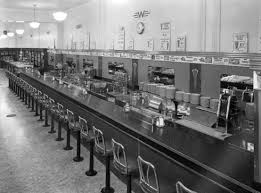The Shadows of High Noon
 Sunday mornings are great. Waking before the sun, baking a pan of chocolate-chip muffins to go with freshly ground coffee, and catching up on a little Syfy Channel. Outside, shadows are being cast across the yard, though short lived, for the rising sun is certain to reel them in. A bit dramatic for a financial advisor’s blog? Maybe. Truth be told, though, I’m a big fan of metaphors, hyperbole, an occasional dash of sarcasm, and onomatopoeia.
Sunday mornings are great. Waking before the sun, baking a pan of chocolate-chip muffins to go with freshly ground coffee, and catching up on a little Syfy Channel. Outside, shadows are being cast across the yard, though short lived, for the rising sun is certain to reel them in. A bit dramatic for a financial advisor’s blog? Maybe. Truth be told, though, I’m a big fan of metaphors, hyperbole, an occasional dash of sarcasm, and onomatopoeia.
But back to Sundays mornings. Our church is big on serving. Only through the efforts of hundreds of volunteers can Sunday morning take place. To that end, I lead a team of guys who serve in the parking lot. It’s our belief that it’s there where the church experience really begins. Someone’s first Sunday could very well be influenced by the guys they meet in the lot. Whether it’s an umbrella in a downpour, or a kind word after a long week, it’s a role we take very seriously and an opportunity we take to heart. And it doesn’t hurt that we get to wear shorts. So, two weeks ago, I’m directing traffic at a fairly busy section of the parking lot, when I literally stumble over a black ceramic coffee mug sitting in the middle of the intersection.
Without missing a beat, I placed the potential hazard off to the side to be dealt with at a later time.
I’m busy, after all. Facilitating flow, greeting guests, and wondering just how much a car like that must cost. Ministry stuff. And after the mass influx subsides, with attenders safely indoors, I peruse the parking lot at a steady 14 mph in the church golf cart…white vinyl bench seat, fold-down windshield, New Testament pocket-edition, the works. All the while, keeping my watchful eye on the lot. My lot.
Souls once seeking spiritual nourishment are soon to be in mass exodus seeking nourishment found only from the buffet line. “Let my people go!” I bellow through the radio, and the team springs into action. And within minutes, the once-full lot is reduced to two kids passing through on bicycles and a smattering of cars temporarily abandoned for the sake of a carpool. The morning is ending just as it began. Serenely. And the shadows of high noon are reduced to nearly nothing.
A week later…
It’s overcast this Sunday, but the rain is waiting for the afternoon pool-goers and won’t be a threat for the morning. With school back in session, and routines the order of the day, we’re expecting a large crowd. And after a few (more) peanut M&Ms, I’m out the side door and into position. And then I see it. Or what’s left of it, rather. The coffee mug I set aside a week ago (out of harm’s way) is now in a hundred pieces and scattered about the lot. My intention was to deal with this potential hazard when I was able to focus on it, when I could step away from my other duties, when life wasn’t whizzing by me while applying eye liner. (Life, that is, not me. While life was applying eye liner. Though there was this season in college when…never mind.) It was an issue to be dealt with – later.
But it wasn’t dealt with later, and the potential threat to tires and flesh is now real. Instead of just throwing the mug away when I had the opportunity, I’m now sweeping up pieces with my hand. Lots of pieces in fact. Will there be flat tires and cut flesh? Hopefully not. Probably not. But the chances for pain are exponentially higher now than they would have been, right? And that’s the point, really.
This was avoidable.
Where’s your coffee mug? Is it your budget? Your debt? Your over-spending spouse? Your over spending self? Or maybe it’s the will that you’ve yet to write? Hey, I get it. Sometimes life won’t slow down long enough for you to take care of the things you have to take care of, much less the things you want to take care. I. Am. Living. That. Now. Trust me. If you’re gonna be on your knees on a Sunday morning, great. I recommend it. Being on your knees on a Sunday morning picking up the pieces of a mess you could have easily avoided? Well, whatever gets you to your knees, I guess.
Deal with it now, before your cup runneth over. “Your cup runneth over.”
Brilliant. Who writes this?




